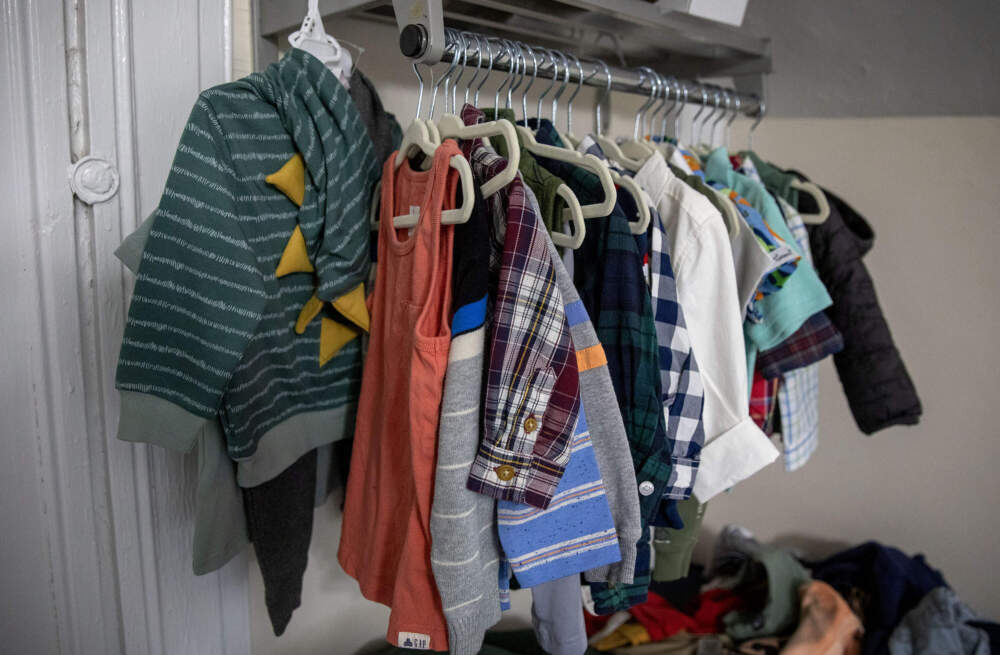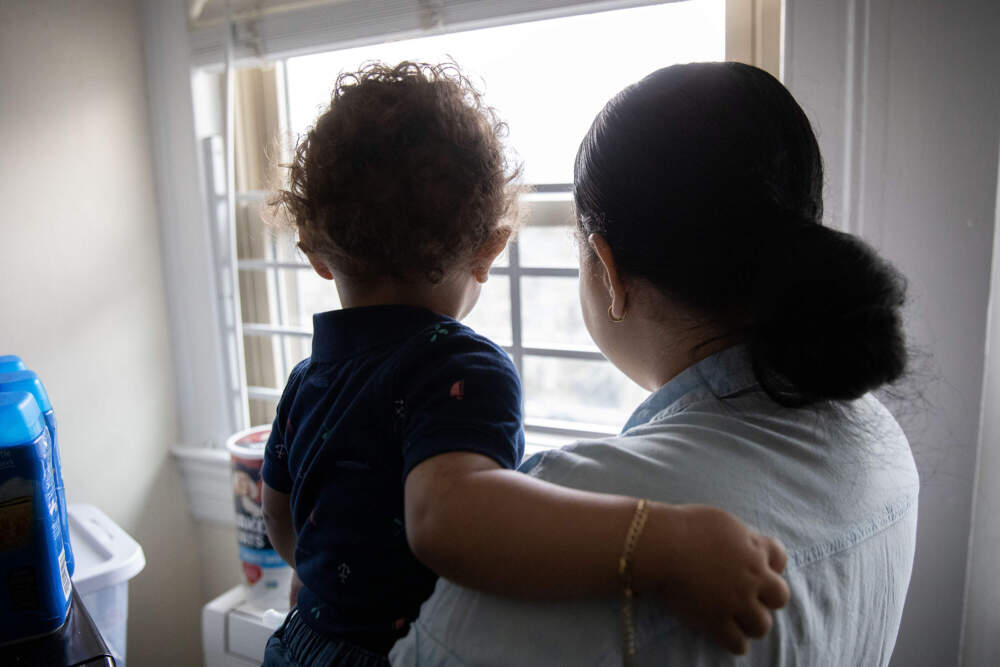Advertisement
Under a deadline to leave shelters, homeless families face obstacles
Resume
Families in the Massachusetts shelter system are up against a clock.
For the first time in the program's 40-year history, state lawmakers have placed a nine-month limit on shelter stays. Some families could be forced out of the shelters by September, even if they have nowhere else to go.
State leaders, including Gov. Maura Healey, say the new time limit will ease pressure on a system bursting at the seams and on track to cost taxpayers nearly $1 billion this fiscal year. But advocates for people experiencing homelessness are worried because it often takes much longer than nine months for families to leave shelters. The current average stay is 16 months, according to the state's Executive Office of Housing and Livable Communities, which oversees the family shelter system.
Ericka Guerrero and her toddler son, Leudi, entered the shelter system in late 2022. The Brookline shelter where they've been living is the only home Leudi has ever known.
They're one of 35 families staying in the old brownstone, which used to be an inn. Each family gets a room. There’s a big communal kitchen on the first floor where they cook meals. Pots and pans hang on a wall in a hallway, and bicycles lean against each other near the entrance.
The Boston-based nonprofit FamilyAid runs the shelter and provides services for the families through a contract with the state.
There's no elevator, so Guerrero walks up to her fourth floor room with Leudi on her hip. The room is spacious. It has hardwood floors, a crib, a small fridge and a microwave. Leudi's outfits hang neatly on a bar in a corner.
Speaking through an interpreter, Guerrero said it’s been a good temporary home for her and her son.
"It's very, very big, so it's impossible to know everybody. But the people that I have encountered, they've all been very nice and very generous." she said. "There are some differences between people, just because you have a lot of people in the same space. But for the most part, it's been a very positive experience."
There are approximately 7,500 families currently staying in the state shelter system, in a mix of shelters, hotels and motels. Last year, the state capped the number of families the system can serve. As a result, more than 750 families are now on a waitlist, with hundreds staying in large, temporary overflow shelter facilities.
The need to make space for waitlisted families was one reason behind the new time limit. The deadline isn't ironclad. Families can qualify for up to six additional months if they meet certain criteria, including being employed, in a job training program or pregnant. Still, the obstacles Guerrero has had to surmount shed light on why some families may struggle to meet the deadline.
Advertisement
The first big hurdle: work authorization
Guerrero came to Massachusetts from the Dominican Republic four years ago to visit family, she said. When she got pregnant, she married the baby’s father, who is a U.S. citizen. This allowed her to apply for a green card. But money troubles strained the relationship, and with the baby coming, Guerrero said, her relatives didn't have enough space for them. So, after Leudi's birth, she moved right from the hospital into the shelter.

Guerrero wanted — and needed — a job to support herself and her son. But first, she had to get a work permit from the federal government. That's one of the big hurdles for new immigrants, who make up about half of the families in the state shelter system. Obtaining work authorization can take many months.
For Guerrero, the process took almost a year: six months to get an appointment with an attorney at a free legal assistance organization and five months to get the permit itself. She now works as a hotel housekeeper.
"I work at a Hilton," Guerrero said through the interpreter, WBUR reporter Andrea Perdomo-Hernandez. "But I've been doing some courses to be a home caregiver, particularly working with seniors. So I'm trying to find work in that field now.”
Massachusetts and other states have pressured the federal government to expedite the work authorization process. The state ran two clinics last fall, in partnership with the U.S. Department of Homeland Security, to help immigrants apply for work permits.
Since November, state officials said, they have helped more than 3,500 newly arrived immigrants apply for work authorization, and most of those permits have been approved.
Child care and housing challenges
Once Guerrero got a job, she faced another big obstacle: getting child care for Leudi. That care is expensive — about $20,000 a year, on average for infant or toddler care in Massachusetts, according to some estimates.
Guerrero applied for a voucher to help pay for it, through the state's Department of Early Education and Care. The vouchers are funded by the state and federal governments. Guerrero got the voucher in about a month, but it takes some families longer. When there's no funding available, families are placed on a waitlist, according to state officials. Families that are homeless get priority on the list.
With work and child care in place, Guerrero was finally able to search for an apartment. Affordable apartments are in short supply in Massachusetts, so there’s heavy competition when a unit opens up — another reason it often takes many months for families to leave shelters. Guerrero called this the most difficult hurdle she's had to overcome.
She applied for several different affordable units. A couple of times, she said, she was notified her application had moved to the top of a list. But that didn't mean she got the housing.
"I would be turned down, or I was rejected because I wasn't a resident of that particular town," Guerrero said. "You apply, you apply, you apply, and then you get the notification that you're almost there, and then they're like, 'Oh, sorry, you don't qualify for X reason or Y reason.' That's been the toughest part.”
According to FamilyAid, some of the reasons families get turned down for apartments include income changes after they applied, low credit scores, no credit scores for families that recently arrived in the country, utility debt or a prior eviction.

A place of their own
After all the setbacks, Guerrero recently found an apartment in Roxbury. It's subsidized through the Massachusetts Rental Voucher Program, which means she'll pay 30% of her income in rent to start, and the state will subsidize the rest. When she makes more money, she'll pay more rent.
Guerrero expected to move at the beginning of April. The date was pushed back by delays involving her rental voucher and funding from a program to help with moving expenses, according to FamilyAid. All of that has further lengthened her stay in the shelter. She hopes to finally move into her apartment this month.
State officials said they and their nonprofit partners are working to help more families get into English classes and job training, and find work, child care and housing, so they can move out of shelters. The number of families leaving shelters has steadily increased in recent months, from 197 families in December to 230 families in February and 288 in April.
However, under the state's new limit, some families could start receiving notices as soon as June 1 that they have 90 days to leave the shelters.
Larry Seamans, president and CEO of FamilyAid, said he thinks the nine-month time limit makes sense financially for the state. But he worries it will increase the risk that some families will become homeless again. He wants families’ humanity to be preserved in the push to move them out of shelter faster.
“Families don't want to live in shelter. They want to be able to raise their children like the rest of us," Seamans said.
He also expressed grave concerns about how the policy could impact children.
"Sixty-five percent of the human beating hearts living in shelters today are young children," he said. "At the center of any response, any [time] limitation has to be what they need to be successful in life, as well.”
Guerrero is dreaming of a successful life for her and her son in their soon-to-be home in Roxbury.
"A year or two from now, what I hope is that me and my son are somewhere calm, relaxed in our home [and] that I'm relaxed enough where we can just enjoy an ice cream or go to the movies," she said. "This whole experience has been like a reflection for me, where I can really appreciate the little things more."
This segment aired on May 15, 2024.

